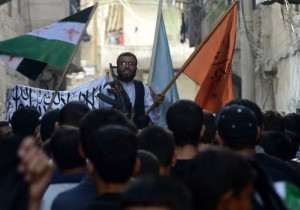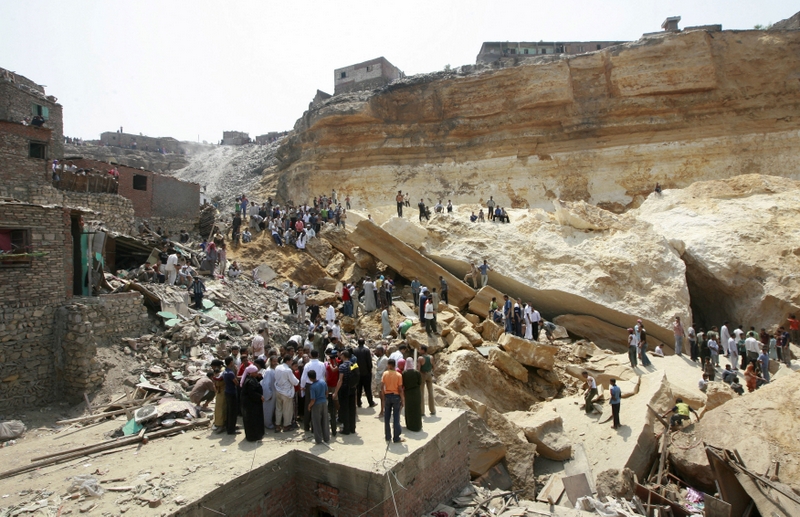
DAMASCUS (AFP) — Rebels cemented their control of Syria’s northern frontier with Turkey after fierce clashes with the army, as their bastions in other parts of the country came under heavy shelling on Sunday.
As the fighting raged, Syrian state television said that government forces had pushed rebels out of two of their strongholds in Damascus province, Qudsaya and Hameh, where a watchdog said the bodies of 10 men were found.
With tension spiking along the Syrian-Turkey frontier after a Syrian shell smashed into a Turkish town last Wednesday killing five civilians, rebels seized the town of Khirbat al-Joz in the northwest province of Idlib after a pitched battle with regime troops, the Syrian Observatory for Human Rights said.
“The clashes at Khirbat al-Joz… ended when fighters of the rebel brigades took control of the area,” said the Britain-based watchdog of Saturday’s battle.
“The fighting lasted more than 12 hours and resulted in at least 40 dead among the regular forces, including five officers, and nine (rebel) fighters,” it added.
Nearly 80 percent of towns and villages along the Turkish border are outside the control of Damascus, according to the Observatory.
AFP correspondents have passed through large swathes of territory in the Idlib and Aleppo provinces of northern Syria that have fallen outside government control, with residents managing their own affairs.
The Observatory also reported that regime forces on Sunday pounded the town of Tal-Abyad in the northern province of Raqa, which sits on the border with Turkey and is held by the rebels.
Turkey had on Friday shelled a Syrian military position south of Tal-Abyad, as part of bombardments of Syrian military positions since Wednesday’s killing of the five civilians.
The incident sparked outrage in Ankara and prompted a UN Security Council condemnation.
The Turkish parliament authorised further military action but Prime Minister Recep Tayyip Erdogan said he was not seeking a mandate for war.
Officials said a mortar round struck inside Turkey again on Saturday, prompting fresh retaliatory fire by Turkish troops, but no casualties were reported.
In Damascus province in the south of the country, the bodies of 10 men, at least one of them a rebel fighter, were found after several days of military operations in the town of Hameh that ended in the government taking control, the Observatory said.
Syrian state television said “Hameh and Qudsaya in Damascus province have been cleansed from the armed terrorists,” using the regime’s blanket term for the rebels.
On July 18, rebels carried out a massive bombing on a security complex in Damascus, killing President Bashar al-Assad’s brother-in-law, the defence minister and a general.
Since then, regime forces have pushed the rebels to the outskirts of the capital but have lost control of several border crossings and are battling to fully retake Syria’s second city of Aleppo, which has been the focal point of the conflict since mid-July.
The Observatory said Sunday’s bombardments in Aleppo targeted the embattled district of Sakhur in the east and Kalasseh in the southwest, the Britain-based Observatory said.
Turkish Foreign Minister Ahmet Davutoglu, in yet another broadside meanwhile against Syria, said Assad should be replaced by Vice President Faruq al-Shara, whom he said “is a man of reason.”
The Turkish minister stressed that the Syrian opposition “is inclined to accept Shara” as the future leader of the Syrian administration.
“Faruq al-Shara is a man of reason and conscience and he has not taken part in the massacres in Syria. Nobody knows the (Syrian) system better than he,” Davutoglu said on public television channel TRT.
Shara, the most visible Sunni Muslim figure in the minority Alawite-led government, is trusted by the regime and was foreign minister for 15 years before becoming vice president in 2006.
Reports that he had defected in August were denied by Damascus, but some opposition leaders say he is apparently under house arrest.
Meanwhile, Mokhtar Lamani, the head of UN-Arab League peace envoy Lakhdar Brahimi’s office in Syria, met rebel members on Saturday, a UN official told AFP.
Lamani visited the Jat area some 50 kilometres (30 miles) south of Damascus and “met leaders of the armed opposition,” spokesman Khaled al-Masri said, as part of contacts with all parties in the conflict.
Since the uprising against Assad’s rule erupted in March last year, more than 31,000 people have been killed, according to the Observatory.


